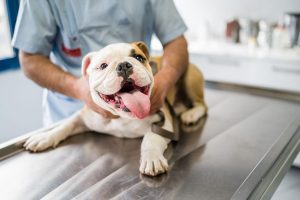What is Canine Cough?
The medical term is “Infectious Tracheobronchitis” which is a contagious upper respiratory infection that is equivalent to a cold or the flu. It’s a virus that is airborne and can often be seasonal. Similar to the common cold, canine cough is contracted through close contact with an infected dog. Dogs begin to show symptoms seven to ten days after exposure. The most common sign of infection is a dry and persistent cough, sneezing, a runny nose, eye discharge, lethargy, and little or no appetite.
Prevention Is The Best Medication
The Bordetella vaccine against canine cough is an important step towards keeping your furry family member healthy. Veterinarians recommend dogs to get their vaccine every 6 to 12 months and are administered by a shot, nasal mist, or by mouth. The vaccine is developed in response to the strain(s) of canine cough that is expected to be most common. However, similar to the flu shot, the Bordetella vaccine is a preventative measure, but isn’t a guarantee as it may not always protect against other strains. Keeping your dog healthy through diet, exercise, and low-stress will help minimize their risk if they are exposed.
Oh No! My Dog Has Canine Cough. Now What?
Even with all the right precautions taken to minimize the risk your dog could still come down with canine cough. Don’t panic if they do! Here are some things to keep in mind:
-
- Puppies, senior dogs, and dogs with a weaker immune systems can be more likely to develop canine cough. If your dog is showing symptoms call your veterinarian to schedule an appointment. They may prescribe antibiotics to help speed up recovery and ease symptoms.
- In most cases, canine cough will run it’s course in a couple of weeks with lots of rest and care.
- Keep your dog away from other furry family members to avoid spreading the virus.
- Using a humidifier can help ease your dog’s cough.

